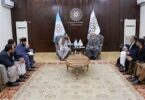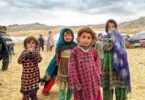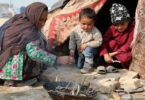KABUL (Khaama Press: The United States Department of States once again called on the Taliban government to reopen high school for girls in Afghanistan, saying “action” is rather needed than merely giving false promises. Following a CNN interview with the acting minister of Interior Sirajuddin Haqqani that was focused on reopening girls’ schools, the US Department of States spokesperson Ned Price said that Kabul has not fulfilled what it promised.
“We have heard these types of comments before, what we care much more about rather than rhetoric is action and we await Taliban acting on these positive signals and reopening schools at all levels across the country which itself would be a welcome development,” Price said, as local media quoted. In March, the so-called Islamic Emirate government on a formal decree banned female students above grade six level from attending classes in across the country, which lead to a widespread concern and reactions.
“On 2 of Hamal [March 23], we were ordered by the office of the Islamic Emirate’s leadership to suspend the girls’ classes from grade 7-12 for a temporary period of time and until a general decision is made. As long as I know, efforts are underway in this regard,” said Aziz Ahmad Riyan, a spokesman of the Ministry of Education. Meanwhile, the Pakistani officials said the right to education for girls in the country are of high importance, urging Taliban leadership to abide by its commitments, especially regarding the right to education of girls and women’s rights.
“We conveyed to the new regime in Afghanistan that they live up to the international commitments, now whether that is their international commitments to the right to girls’ education and allowing the women’s rights in Afghanistan within that context or it is their international commitments to not allow their soil to be used for terrorist activity,” said Pakistani Foreign Minister Bilawal Bhutto Zardari. However, authorities in Kabul have defied the objections, saying it is baseless to criticize their leadership. The Islamic Emirate, in fact, has been committed to its obligations to the international community.
“It is baseless to say that they will not do what the minister has said, and it is also baseless to say that the Islamic Emirate has not done what it promised in the past,” said Abdul Nafi Takur, spokesman for the Ministry of Interior, according to the report.
While the current leadership eyes formal recognition to rule Afghanistan, political analysts see inclusive government and observation of national and international commitments the only way out, saying Taliban can only then have diplomatic relations with international community. “If the Islamic Emirate of Afghanistan really wants to get out of international isolation and have diplomatic relations with foreign countries, it needs to meet its national and international commitments to reopen girls’ schools above the sixth grade and form an inclusive government which includes all,” said Sayed Javad Hosseini, political analyst.
But the Islamic Emirate did not provide an exact date as to when girls’ school will be reopened, exclaiming it has set up a commission to allow female students above sixth grade to go to school. Last month, Mullah Abdul Ghani Baradar, the first Deputy Prime Minister, gave hope on girls’ education in Afghanistan, saying the issue is pending for a better decision. However, he did not shade brighter light on the status of the decision in progress or the flexibilities the Islamic Emirate may consider on female education across the country.
“A good action will happen in this [education] regard,” Baradar said, according to local media. “There may be goodness in this [education] regard.” Furthermore, the Ministry of Education (MoE) expressed preparedness to comply with the final decision made under the current leadership should they announce reopening of secondary and high school for girls. In August 15, 2021 the Taliban took control of Afghanistan, rolling back the foremost achievements of the post-2001 reconstruction efforts on overall growth of the country, including the education sectors.






